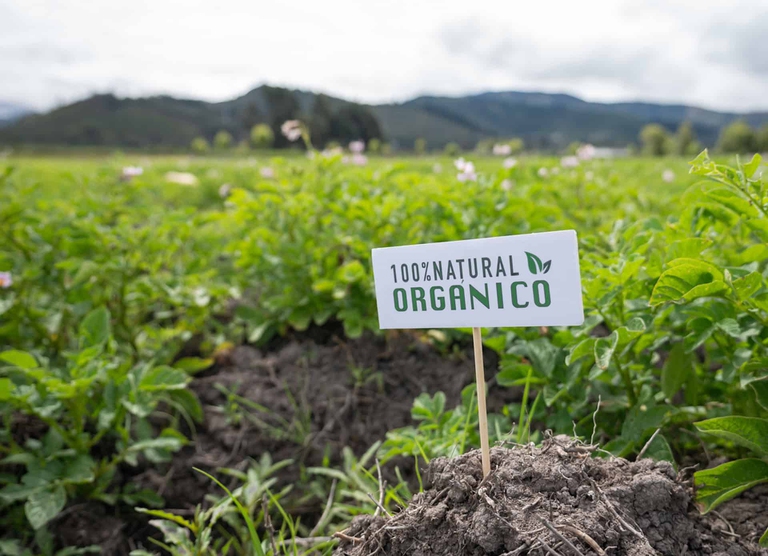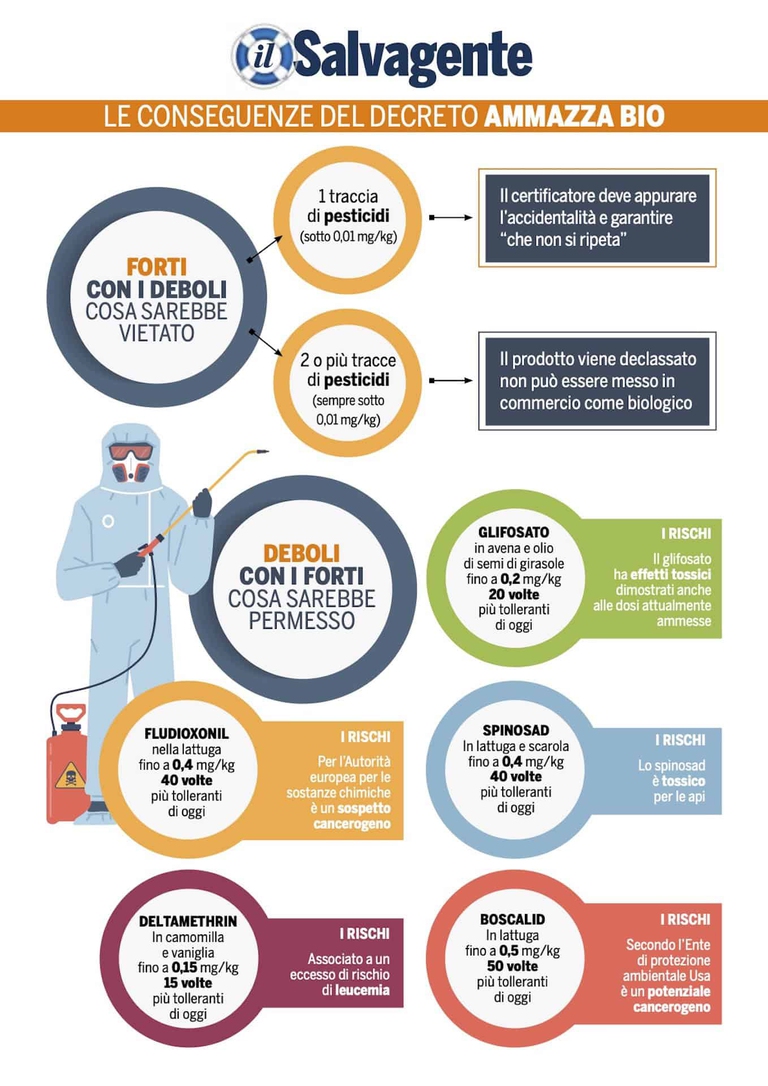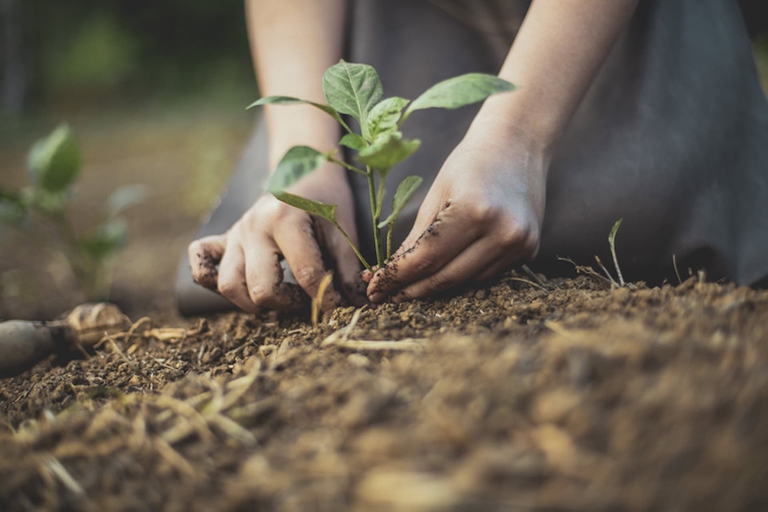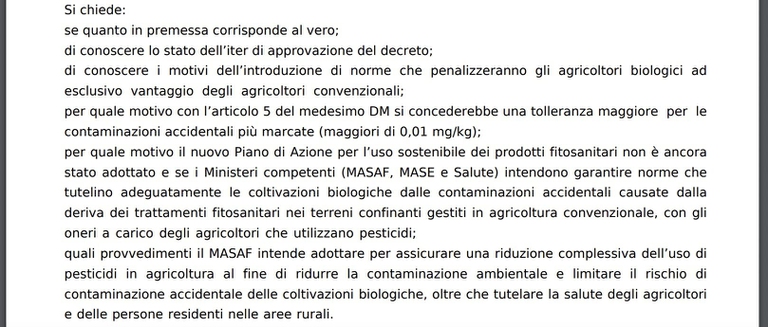https://www.lifegate.it/decreto-contaminazioni-biologico
- |
- The draft "contamination" decree establishes new rules for accidental traces of residues in organic products.
- For the magazine il Salvagente and the WWF it is a decree that risks discrediting and penalizing organic farming.
- Federbio's position is different, but like the WWF, it urgently requests the national action plan for the sustainable use of pesticides.
The Ministry of Agriculture is working on the so-called “contamination” decree for the adoption of measures aimed at "avoiding the inadvertent presence of substances not permitted in organic production".The magazine the Lifesaver he renamed the draft text “bio-killing decree” calling it a “poisoned meatball” for organic producers, while the WWF Italy denounced the risk that theorganic farming come marginalized, harassed and penalized if these rules come into force.For Federbio, who presented comments on the draft text, the issue must be analyzed as a whole.

What does the "contamination" decree say
According to thearticle 3 of the draft decree, when it is detected in an organic product accidental presence of a pesticide below technical zero, i.e. 0.01 mg/kg, the product complies, but - unlike what happens now - an investigation is launched so that the certifying body can ascertain the accidental contamination and guarantee that it does not happen again;it is also established that in the presence of two tracks Of pesticides, the product can no longer be sold as organic.
Atarticle 5 of the decree it is then said that also in accidental presence of pesticides in larger quantities at technical zero (above 0.01 mg/kg) the product is not immediately downgraded as happens with the current standard, but an investigation must be started:if it is established that it is accidental contamination, the product can be certified as organic as long as the trace does not exceed 1 percent of the maximum residue limit.
The Lifesaver:“A bio-killing decree”
For the magazine il Salvagente, the decree appears contradictory and risks becoming an obstacle for organic farmers whose products could be downgraded just because they border conventional crops that contaminate organic crops with pesticides.The risk would also be to discredit an entire sector that enjoys consumer trust:“With these rules – the magazine explains – glyphosate, the probable carcinogenic herbicide according to Iarc-WHO, would be tolerated up to 20 times the permitted limit in some crops".

“We have renamed this text the 'bio-killing decree',” he declared Riccardo Quintili, director of il Salvagente.“On the one hand it is very severe towards organic, punishing the person who suffers accidental contamination and not the conventional farmers who cause it.On the other hand, it grants a broader tolerance that I don't think the organic sector feels the need for.Who benefits from all this?Perhaps to the conventional food lobbies, certainly not to the organic farmers who perhaps don't realize that the decree is a poisoned meatball for them.Furthermore, consumers would end up putting organic and zero residue on the same level:the difference, however, is that organic farming, in addition to giving a final product without traces of pesticides, does not use synthetic chemicals even during the agricultural process".
Wwf:“The issue concerns human health, but also environmental”
“This latest decree from the Ministry of Agriculture adds to previous provisions which together define a framework of inconsistent, oppressive and penalizing rules for virtuous farmers who have decided to practice organic farming, i.e. producing without the use of pesticides and other chemical substances of synthesis,” he said Franco Ferroni, Head of Agriculture at WWF Italy.“These farmers are asked to respect unlikely limits, suffering damage from farmers who use poisons.This is in the absence of effective rules for the prevention of accidental contamination."

And again:“It is not just about guaranteeing the consumer's right to have a safe product without contaminants, but the issue concerns the overall reduction of the risk of exposure to pesticides, the protection of human health, but also of the environment according to the One global approach Health.The decree ignores that organic farming pays attention to the entire production process, avoiding the use of pesticides.The writing of the text has clear objectives behind it:benefit zero residue and not annoy those who do conventional agriculture.We therefore claim the right to simplification also for organic farming and ask for the cancellation of articles 3 and 5 of the decree". Ferroni then underlined the urgency of drafting a national action plan on the sustainable use of plant protection products (Pan) according to the EU directive, a plan which in Italy expired in 2019 and has not yet been renewed.
The question from the Honorable Eleonora Evi on the "contamination" decree
The Honorable Eleonora Evi of the Democratic Party presented ainterrogation on the decree to find out the approval times and to ask why it was decided to grant higher accidental contamination tolerances for organic products, as well as to understand the reasons for the complete inaction on the renewal of the Pan.“The organic legislation should be one, the European one:thus there is a risk of creating differences and unfair competition between European and Italian organic products", stated the MP.“My reading of the situation is that, despite the declarations in defense of the Italian organic sector, in reality something else is being done, that is, supporting the status quo and the conventional sector with damage to public and environmental health.The decree is a confusing action to be opposed and stopped."

Federbio:“Decree recognizes accidental contamination, but a regulatory framework is needed to protect organic agriculture”
The position on Federbio's decree, however, is a little different.The president Maria Grazia Mammuccini he explained that, unlike the "controls" decree, approved in October 2023 without immediately consulting the organic organizations, in the case of the "contamination" decree, the government sent the draft text to the representatives of the sector so as to allow them to send their own observations:“We raised several issues:regarding article 3 we ask that in case of residues below technical zero it be clarified better That Not vhyenas an investigation was launched with the same purpose as that for a sample with residues above this limit, but rather an audit be carried out to understand the origin of the contamination and therefore to review prevention measures;secondly, we pointed out that several non-permitted substances may be present in a formulation and that it is therefore necessary to review the issue of non-compliance of the product with two traces of residues detected".
On article 5, Federbio does not see the same critical issues as WWF and Salvagente:“The decree recognizes the possibility of accidental contamination and does not immediately penalize the organic farmer with downgrading, as has been the case since 2011.By tolerating contamination no more than 1 percent of the maximum residue limit allowed for a product, it still guarantees the distinctiveness of the organic product."

Federbio then made some general observations on the text:“We ask for a working table aimed at developing a simplification path for organic farming and a review of the amount of sanctions relating to violations of a bureaucratic nature.Above all we ask for elaboration and approval of National action plan for the sustainable use of pesticides, stopped since 2019.We must defend organic products and consumers according to the "polluter pays" principle.Currently, the safety bands are the responsibility of the organic producer who must collect and sell the organic products separately in case of accidental contamination.Conventional producers would not have these difficulties and if they were responsible for maintaining safety distances, it could even be a way for them to experiment with organic farming."
Worth knowing.THE'Italy boasts the 19.8 percent of agricultural area certified organic, a percentage very close to the objective of 25 percent by 2030, set by the European "Farm to Fork" and "Biodiversity 2030" strategies.After the withdrawal of the Sur regulation on the sustainable use of pesticides, currently organic farming is the only tool to combat, at a European level, the use of synthetic chemical substances.
